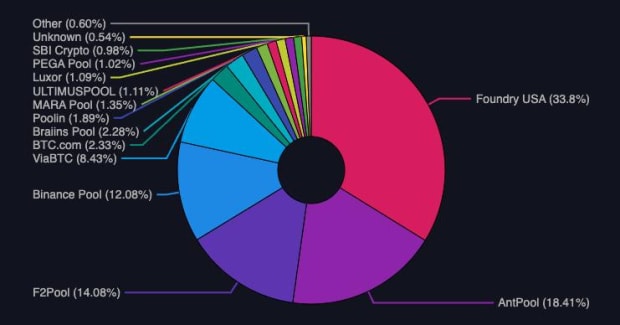Most Public Bitcoin Miners Are Thriving
Five public miners produced a total of 1,475 bitcoin in November, worth nearly $80 million.
The bitcoin mining industry is booming, and public miners are employing all their efforts to increase daily production and refrain from selling. Marathon Digital, Hut 8, Riot Blockchain, Bitfarms, and HIVE produced a combined total of 1,475 BTC in November, worth nearly $80 million at the time of writing.
Bitcoin miners outside of China started enjoying increased profits as the communist country announced its crackdown on the industry. In the summer, the activity was banned entirely from Chinese soil, leaving no other option for miners than to relocate operations abroad. In the meantime, overseas companies in the industry started benefiting greatly from a decreased Bitcoin total hashrate, scoring bigger profits without increasing capacity. Now, months later and with a nearly fully recovered Bitcoin hashrate, the momentum has held.
Nasdaq-listed Riot Blockchain mined 466 bitcoin last month, an increase of approximately 298% over the same period the previous year, the company said in a statement Thursday. So far this year, the miner has produced 3,387 BTC — 262% more than in the first 11 months of 2020. Its deployed fleet of nearly 30,000 rigs is outputting three exahashes per second (EH/s) and adding more bitcoin each month to a stack of 4,464 BTC as of November 30.
Riot also wants to increase its operational efficiency further. On Wednesday, the company announced it had acquired the electrical equipment provider ESS Metron in a $50 million deal. The supplier is key to Riot’s operations, and now as internal to the company’s operations, it will enable timely installation of new miners.
On Wednesday, Canadian Bitfarms, another prominent bitcoin miner listed on the Nasdaq, said that its bitcoin production had surpassed 3,000 newly issued coins in 2021, 96% of which was deposited into custody. The company mined 339 BTC in November, up from 343 in the previous month, and increased its capacity by 16% in the same period. Bitfarms’ fleet currently outputs 2.1 EH/s of hashrate power.
Public miners have committed to a “hodling” strategy in the past few months, seeking to capitalize on the scarcity of bitcoin and spend fiat currency instead. Although most of their expenses, such as electricity, are still priced in fiat, miners can leverage their hoard of BTC to issue collateralized loans and access low-risk capital in U.S. dollars.
Large miners’ ferocious stockpiling of bitcoin likely caused a BTC supply shock in October. The bitcoin price appreciated more than 50% in that month, partly because of big players’ reluctance to let go of their earned rewards. As miners are the ones to bring new coins to market, their refusal to do so impairs the ability of fresh BTC to be traded, further reducing an already scarce supply.
Hut 8 is one of such “hodlers.” The Canadian miner deposited all of its 256 BTC mined in November into custody, the company said on Thursday. Hut 8 currently has an installed hashrate of approximately 1.7 EH/s and 5,242 bitcoin in reserve.
HIVE, another miner from the North, said on Friday it produced 218 bitcoin last month, following a record-breaking month in October. The company has 1.31 EH/s of installed Bitcoin mining capacity.
Despite most public miners having thrived in November, Marathon Digital wasn’t so lucky. The miner with the largest bitcoin holdings saw its hashrate capacity drop last month due to a series of maintenance work on one of its power plants. Marathon produced only 196 BTC in November, down from over 417 bitcoin in the previous month. But the miner said its Hardin, Montana, facility is now fully operational, having produced 34 bitcoin on its first day at full capacity.









